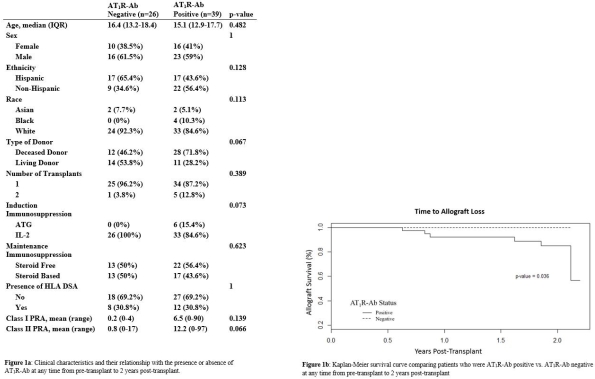Angiotensin II Type 1 Receptor Antibodies Are Associated with Allograft Loss in Pediatric Renal Transplantation.
1Pediatrics, University of California-Los Angeles, Los Angeles, CA
2Pathology and Laboratory Medicine, University of California-Los Angeles, Los Angeles, CA
3Anatomic & Clinical Pathology, University of California-Los Angeles, Los Angeles, CA
4Biostatistics, University of California-Los Angeles, Los Angeles, CA.
Meeting: 2016 American Transplant Congress
Abstract number: 230
Keywords: Antibodies, Graft survival, Kidney transplantation, Pediatric
Session Information
Session Name: Concurrent Session: Kidney: Pediatrics
Session Type: Concurrent Session
Date: Monday, June 13, 2016
Session Time: 2:30pm-4:00pm
 Presentation Time: 3:06pm-3:18pm
Presentation Time: 3:06pm-3:18pm
Location: Room 311
Background: Angiotensin II type 1 receptor antibody (AT1R-Ab) is associated with vascular injury and allograft failure in adult kidney transplantation. Its role in pediatric transplantation remains unknown. We aimed to determine the clinical impact of AT1R-Ab in pediatric kidney transplant recipients.
Methods: 65 pediatric patients were monitored at transplant and for 2 years post-transplant from August 2005 to November 2014 for human leukocyte antigen (HLA) donor specific antibodies (DSA) and AT1R-Ab. AT1R-Ab (ELISA test) and HLA DSA (Luminex bead assay) were measured pre-transplant, 6 months (m), 12m, 24m post-transplant and during episodes of kidney transplant rejection. A value >17 units/ml was considered positive for AT1R-Ab, while MFI cut off >1000 was considered positive for HLA DSA. Biopsies (Bxs) were performed at 6m, 12m, 24m post-transplant per protocol and for clinical suspicion of rejection. Bxs were evaluated using the 2013 Banff criteria. Clinical risk factors, renal function, hypertension, and allograft loss were monitored.
Results: The prevalence of AT1R-Ab was 58%. AT1R-Ab was negative in 40%, de novo in 34%, and preformed in 26% of patients. AT1R-Ab was associated with tubulitis (p=0.022), but not C4d positivity, peritubular capillaritis, or arteritis (data not shown). AT1R-Ab was not associated with any identifiable risk factors, including the presence of HLA DSA (Figure 1a). AT1R-Ab was associated with allograft loss (p=0.036, Figure 1b), but not hypertension or decline in eGFR by 50% (data not shown).
Conclusions: AT1R-Ab is highly prevalent in pediatric renal transplant recipients and is a risk factor for graft loss independent of HLA DSA. AT1R-Ab monitoring should be considered in pediatric renal transplant recipients.

CITATION INFORMATION: Pearl M, Zhang Q, Palma Diaz M, Grotts J, Brook J, Gjertson D, Weng P, Reed E, Tsai E. Angiotensin II Type 1 Receptor Antibodies Are Associated with Allograft Loss in Pediatric Renal Transplantation. Am J Transplant. 2016;16 (suppl 3).
To cite this abstract in AMA style:
Pearl M, Zhang Q, Diaz MPalma, Grotts J, Brook J, Gjertson D, Weng P, Reed E, Tsai E. Angiotensin II Type 1 Receptor Antibodies Are Associated with Allograft Loss in Pediatric Renal Transplantation. [abstract]. Am J Transplant. 2016; 16 (suppl 3). https://atcmeetingabstracts.com/abstract/angiotensin-ii-type-1-receptor-antibodies-are-associated-with-allograft-loss-in-pediatric-renal-transplantation/. Accessed February 24, 2026.« Back to 2016 American Transplant Congress
